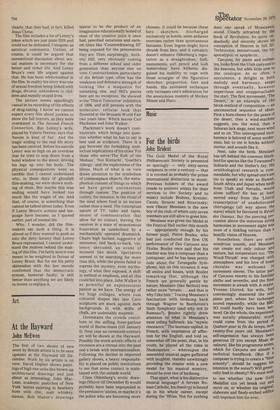Music
For the birds
John Bridcut
The Gold Medal of the Royal Philharmonic Society is presented so sparingly — only sixty-seven recipients in over a century — that it is coveted as probably the prime international distinction in music. Previous holders of the award (made to eminent artists for their services to the Society and to music) include Brahms, Kreisler, CasaIs, Strauss and Stravinsky; now Olivier Messiaen is the new boy of the club, of which only seven members are still alive to greet him.
Messiaen was given the Medal at the Festival Hall earlier this month — appropriately enough by his former pupil, Pierre Boulez, who had just conducted the first UK performance of Des Canyons aux Etoi/es. Boulez once said that his teacher was less a composer than a juxtaposer, and he has been pretty rude about the Turangalla Symphony, but on this occasion it was all smiles and kisses, with Boulez remarking that, although the French are generally gentle by nature, Messiaen (like Berlioz) was rather more "erratic ... and that is why I like him." Tracing Messiaen's fascination with birdsong back through Wagner to Beethoven's Sixth Symphony (and why not to Rameau?),13, oulez rightly drew attention to' what is Messiaen's most telling hallmark: his "mystic resonance." The laureate replied, in French, with expression of affection for the English, and told us, somewhat off the point, that, in his youth, he played all the roles in Shakespeare — whereupon the assembled musical sages guffawed with laughter, thereby unwittingly providing the master with a new model for his musical mimicry, should he ever tire of birdsong.
That apart, what is his distinctive musical language? A fervent Roman Catholic, his theology is bound up in his whole career, except during the 'fifties. Not for nothing does one speak of Messiaenic sound. Clearly attracted by the Book of Revelation, he quite unabashedly and sincerely shows his conception of Heaven in full 3D. Technicolor, sensurround, the lot: apocalyptic or apoplectic.
Canyons, for piano and orchestra, looks from the Utah canyons to the heavens, but adds little new to this catalogue. As so often, a succulence, a delight in both melody and harmony, seeps through eventually, however impervious and unapproachable the start. The first movement, 'The Desert,' is an example of the block-method of composition — an unconnected sequence of ideas. First a horn-theme for the peace of the desert, then a wind-machine suggests, yes, the wind, then a Saharan lark sings, next more wind and so on. This unintegrated incoherence is beloved of some modernists, but to me is bricks without mortar, and sounds like it.
Next, take the birds. Messiaen has left behind the common blackbird for species like the Townsend's Solitarie and the Steller's Jay. His ornithological research is commendable, but why spread one's net (so to speak) so wide as Hawaii, South Africa and Japan when birds from Utah and Nevada, would alone suffice? He has at least moved away from the 'Literal transcription' of unadulterated chirrupings (all way above the stave) which he favoured in Reveil des Oiseaux. But the piercing percussion above the sonorous string harmonies in movement eight was more of a tinkling torture than a beatific vision of Heaven.
Nonetheless, there are sortie wondrous sounds, and Messiaen can create not only colour and texture, but temperature too. 'The Wood-Thrush' was charged with atmosphere, and his love of brass chorales was welcome in movement eleven. The latter Part of Canyons resorts to his familiar sixths and sevenths, and the final movement is awash with A major. Yvonne Lloriod, his wife, had convincingly mastered the solo piano part, where her technique scored repeatedly, while the BBC SO could hardly have been bettered. On the whole, the experience was aurally pleasurable: much could come from the period 0f Quatuor pour la fin du temps, noW twenty-five years old. Messiaen's self-expression has always been generous (if you except Mode de valeurs), like his programme notes, which for Canyons are almost a technical handbook. (But if a composer is trying to create a "blue sonority", should he suggest his intention in the notes?) Will generosity lead to obesity? We must wait to see whether the new Gold Medallist can yet break out and move on, or whether his original, elaborate and finely-etched edifice will imprison him for ever.


































 Previous page
Previous page